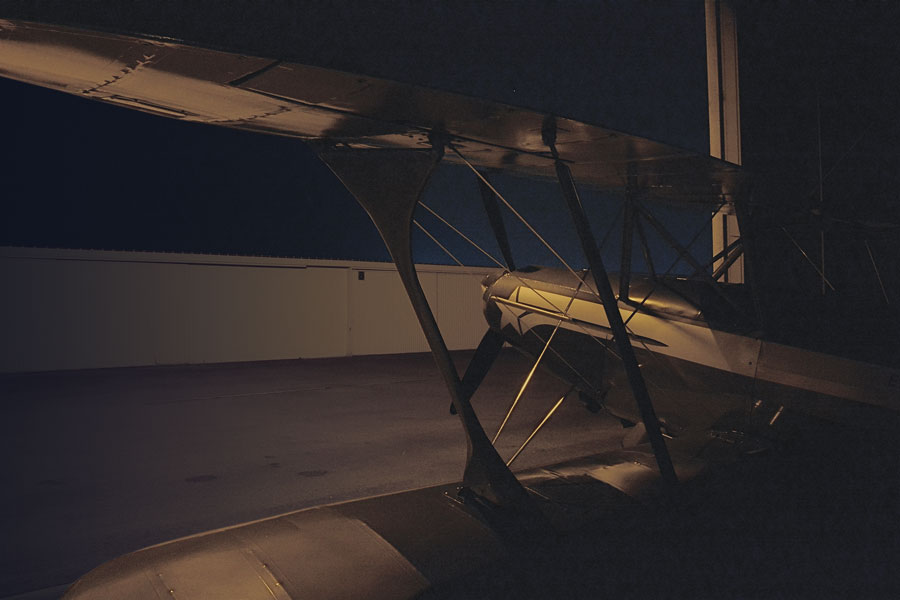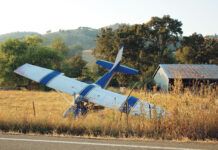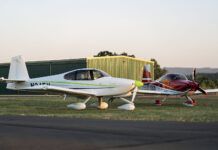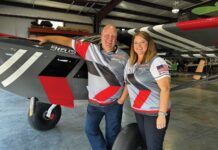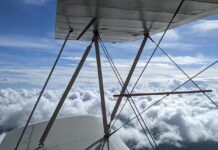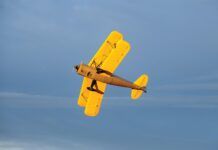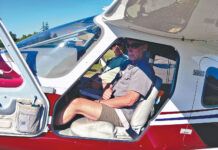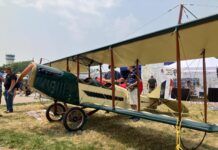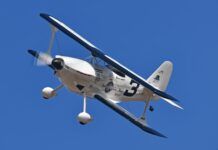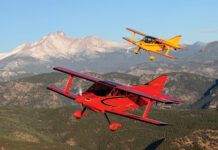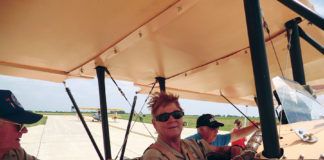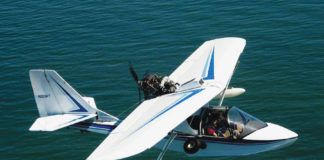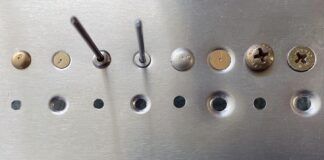There was the thought of going somewhere tomorrow, to a commercial fly-in. The event was not so far away as to immediately dismiss it, but there was the promise of gusting east wind from the weatherman, and even if not so far away, there was still plenty of fuel involved. And the day after that was yet another must-make trip to another large event, so there was conservation of energy to consider as well. But there would be things to see and people to meet, so it was an idea, and the tanks had been topped, the oil brought to its pre-trip level, and I had just finished cleaning the small windscreen and wet toweling off the dust.
It was time to get home and find some sleep. I snapped off the hangar lights, then walked back inside to the old floor lamp, kept as much to add some visual warmth as to signal the way to the beer fridge. It stands where the upper wing of the Starduster forms an arch over the walkway between the plane and the suds. I switched off the light.
Instantly there was the familiar blindness of light-adjusted eyes unable to quickly accommodate darkness. But that’s always just a moment, and soon the yellow-orange low-pressure sodium security lamp outside and above the open hangar door softly revealed the front of the airplane. Who doesn’t hate outdoor lights at night, all bluster, glare and blinding, better at making darker shadows than showing anything important? But at just this moment and just this position, the light was blessedly outside and hidden from my eyes behind the upper hangar.
Up there it is somehow supposed to make an opaquely black asphalt taxiway more useful should anyone actually be present at such a little out-of-the-way airport in the middle of the night. Furthermore, its all-so-’80s rectangular cover was half full of dirt, so the light shown mutedly, its single wavelength apologetic against the night sky and struggling to brighten even the area just below it.
Inside the hangar, with the sliding door half open, all you could really see was the left front of the biplane. There were the wings, the upper a silhouette, the lower glowing reflectively from the unseen source above the hangar door. The flying and landing wires, lean and streamlined, jauntingly angled and gleaming because that’s all polished stainless steel knows to do, were, as always, clamoring for attention. The three-blade prop, also as usual, formed its somehow always asymmetrical angles. Unless you stand in front of it, there’s always a blade or two missing from sight.
Outside, high up was Jupiter. Brightly overhead, how many millions of miles distant yet demanding to be seen as only something reflecting the sun can. If I stood just so, I could see the Starduster wing tip and Jupiter framed by the elliptical curve of the wing and the hangar doorway’s surrounding blackness.
A dry desert night breeze gufted randomly into the hangar, making a paper tag hanging on a cord sway and sometimes squeak. The weatherman was right. The hangar faces east and has trouble lying about ill winds.
Across the narrow taxiway light, pollution glowed behind the adjacent hangars, cordoning the half biplane and I into our own small space, into a shadow at the doorway of our hangar cave. A safe little spot, in the shadow, and involuntarily the beauty arrested me and demanded I soak in the comfort of being there. The soft light, the airplane almost more imagined than real, the endless bothersome details so prominent in sunlight now shunt into the shadows leaving only the sky and airplane as guides to consciousness. And without prompting, I remembered those who had helped me reach this happy spot where I own an airplane on a warm desert night where the soft, dry breeze would paw at tags on a battery charger’s cord.
Most distant was my flight instructor. Of course, there have been multiple flight instructors along the last 44 years, but for me, an old man with just a Private, the guy who took me from earth to sky when I was 16 will forever be my flight instructor. He was also my employer—line boy that I was—and one of those who transitioned me from the familiar place framed by parents into the wider world and eventually my own perception of it. He was also experienced, demanding, and bored with chaperoning dumb kids around the pattern but far too professional to let that get in the way. I have not seen him in 35 years, an unabatedly permanent result of him, his Pitts Special, and the earth intersecting at a barely acute angle on an otherwise pleasant July evening. So he remains permanent in my memory, fixed as a checklist, a force for doing things the right way or bearing the consequences.
Mom helped, too. The freer thinker, Harley rider back when the shifters lay alongside the gas tank, Mom simply oozed great ideas and insisted you chase yours.
And the friends, so many friends. Some simply listened and affirmed my thoughts, others—far more experienced than me—have given advice, often bravely when it was needed most and wanted least. There were friends who helped build parts, maybe fabricating little tabs or creating duct and baffle artwork beyond my imagination and insulted when I tried to pay them. Friends who lent instruments or chased down GPS units they knew I needed but didn’t have the gumption to find myself. Friends who gave rides, friends who gave time, friends who took pictures, friends who got me through ground school, friends who wanted to buy gas. Famous flyers who became friends despite my lowly station. Luckily, most of these friends are still here, but a few aren’t and I miss them completely.
Friends, I concluded, were just as beautiful as dry desert nights, and if you’re lucky, more numerous.
Of course, there were those we’ll never meet, the ones who came before and invented wings and engines, propellers, and rudders. People who overcame impossible inertia to build the airport I call home, people I can’t thank except to pay something forward. What a privilege it is to live when we can fly.
By then the earth had rolled eastward because it must, and I had to shift my feet to bring Jupiter from behind the hangar roof. And there was the thought of going somewhere tomorrow, and it was still only a thought. I did not need a light to find my way out of the hangar.

